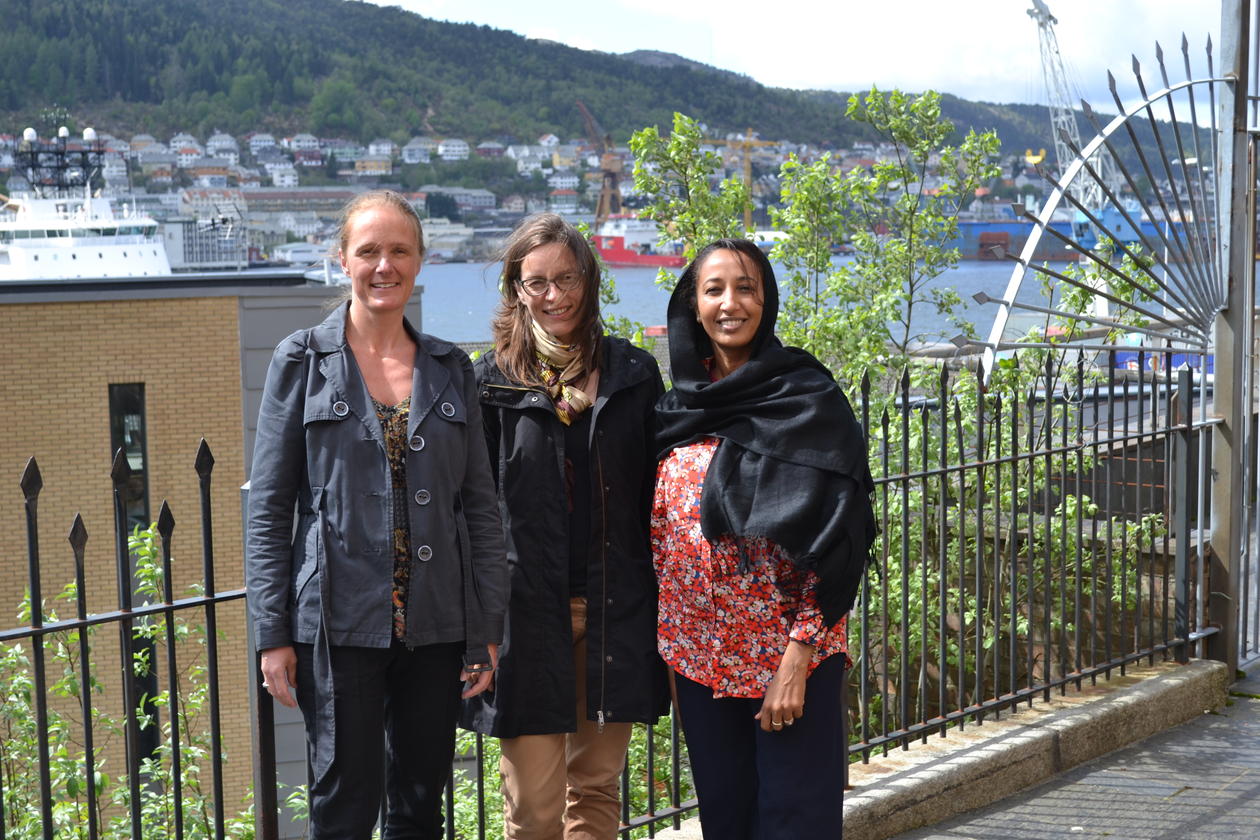Gathering around the topic of food
Inger Elisabeth Måren, Vigdis Vandvik and Howaida Faisal Abdelrahman are hard at work with only weeks remaining before the start of the Summer School.
Hovedinnhold
The Bergen Summer Research School (BSRS) is a joint venture under the leadership of the University of Bergen with the Norwegian School of Economics and Business Administration, Bergen University College, Chr. Michelsen Institute and UniResearch. Since 2008 it has gathered international experts and PhD students to discuss and explore global development challenges from the perspectives of different academic disciplines.
One of the main priorities of the BSRS since its inception has been to welcome researchers and students from all over the world, including the Global South, as their experiences hold a particular relevance for the topics of the summer school. In order to find answers to global challenges, it is essential to ensure that the discussion is characterised by both academic, cultural and geographical diversity.
This has led the BSRS to provide travel grants for students from the Global South. The scientific input from all corners of the world is also of great importance to the University of Bergen, which has global and development-related research as one of its two priority areas.
Each year the BSRS has focused on a different theme: Global Poverty; Climate, Environment and Energy; Global Health; Norms, Values, Language and Culture; Transnational Migration and Global Development. All were under the umbrella of Global Development Challenges.
Looking at food from different perspectives
After a four year project period the BSRS has now been established as a permanent annual event at UiB. The topic of BSRS 2013 is Food as a Global Development Challenge, and will be divided into four courses, represented by economics, geography, terrestrial and marine biology, as well as micronutrient research. With the contributions from these disciplines there will be a variety of topics under discussion, such as micronutrient deficiency, global food distribution, biodiversity and the biological sustainability of food resources, as well as current changes in the global food system. School starts on June 17th and lasts for two weeks.
Click here to learn more about BSRS 2013.
The different course leaders organize sessions for the 62 participating PhD students, but there are also a number of plenary sessions open to the public. Leading experts have been invited from all over the world to offer their insight on topics ranging from nature conservation, the UN millennium development goals, the state of marine ecosystems and the communication of science to the public.
Click here to learn more about the keynote lectures.
Hard but rewarding work
Scientific leader Vigdis Vandvik, administrative coordinator Howaida Faisal Abdelrahman and scientific coordinator Inger Elisabeth Måren took a break from their busy schedules to talk about what it takes to organise the summer research school, as well as its importance for those who take part in it. With just weeks left the days are becoming increasingly hectic, but the organisers also take satisfaction in seeing the different pieces fall into place.
According to Vigdis Vandvik the programme serves multiple purposes:
– We want the best academic environment to offer good targeted courses within the respective fields, but we also want to foster communication across disciplines, and contribute to research on global challenges. So it’s kind of like a Kinder Egg. We think this year’s topic has worked out really well. Food may seem like a narrow topic, but it is actually really wide. There are very few things in human lives and livelihoods which are not in some way connected to food, says Vandvik.
– In this manner the students receive excellent training within their fields, but also a broader perspective through the keynote lectures, roundtable sessions and morning seminars, she adds.
Getting the details in place
Måren stresses that it is challenging but important to bring disciplines together in this manner, as such courses and research in general tend to be discipline specific:
– What we’re doing with BSRS is not so common, because research and education at the University of Bergen, like many research universities, is organised according to disciplines. There are two levels of challenges: the administrative ones, with students coming from all over the world, and the scientific ones, getting people to work around a common theme, across disciplinary borders.
Abdelrahman has been the administrative coordinator for the BSRS since 2008, and she knows what it takes to make the summer research school a success. The organisers have made countless phone calls, they have sent and received thousands of e-mails, coordinating with already busy course leaders, keynote speakers and students. In addition there is the logistics of travel and accommodation, setting course schedules and planning events with local partners, such as the Municipality of Bergen and the Bergen Chamber of Commerce and Industry. Added to this are the inevitable communication problems:
– Some of the students are impatient. If they don’t get a reply within two hours they start sending e-mails all over the university, asking for information. They don’t take time difference into consideration either, says Abdelrahman.
But the effort is definitely worth it. All three stress that the results are always rewarding for both organisers, researchers and students:
– This is what I like – people from different academic and cultural backgrounds coming together. In addition this represents a significant opportunity for students from the Global South to discuss their own research with international scholars, as there are political and economic barriers which make this impossible in their own countries. The BSRS also gives the opportunity to PhD students and researchers from the Western institutions to discuss their research with those of similar academic background coming from the Global South. Both get the benefit of looking into their own research from various perspectives. And that is important in order to build an academic network, says Abdelrahman.
– Yes, they will get valuable feedback from international experts in their respective fields, Måren adds.
The value of interdisciplinarity
The Bergen Summer Research School also serves to demonstrate that scientific disciplines need to combine their forces in order to explain and provide the tools to deal with complex global issues. In this regard, the BSRS is responding to the needs of society:
– It’s really about research and its impact on society, and vice versa, says Vandvik, who points to the topics of the keynote lectures as examples of complex issues which are in need of scientific input from a number of disciplines.
A call to UiB researchers
In the opinion of the organisers more local academic experts should take the opportunity to take part in the BSRS:
– Getting renowned people to come to give lectures and teach may be easier under the BSRS framework than in standard departmental PhD courses. The BSRS offers a cross-disciplinary umbrella and additional administrative and financial support that can be used to give a ‘lift’ to the on-going PhD training within most of our departments and faculties, says Vandvik.
– There is more resistance within the university than outside. Many don’t see that the BSRS is different from normal teaching activities. It’s good to break out of the department framework to do interdisciplinary work, says Måren.
The summer research school may be over on June 28th, but UiB will soon after start preparations for BSRS 2014, when Global Governance is the topic that will bring together lecturers, teachers and students from around the world. Calls for course proposals will go out to all departments and collaborating institutions, and the BSRS team is eagerly awaiting contributions from across the Bergen academic milieu towards BSRS 2014.

